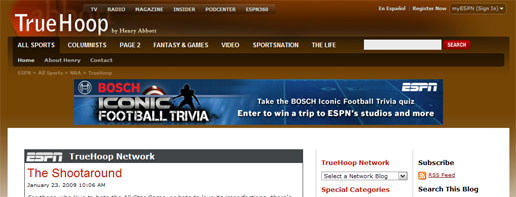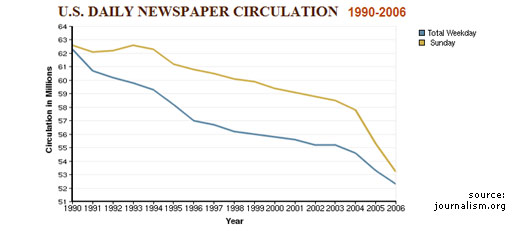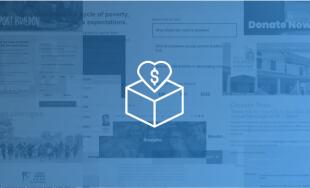Local News Beware: ESPN Launches a Blog Network
It's a sign of the times. As the power of traditional local media wanes, ESPN is turning to independent content producers to fill the gap.

In February of 2007, ESPN announced that it acquired TrueHoop, a leading NBA blog. It was run exclusively by Henry Abbott who became an official ESPN employee and continues to run the blog.
Since the takeover, it has been clear that Henry has been passionate about the way individual NBA teams are covered by local media. As the power and pocketbooks of most local media outlets has shrunk, the quality and scope of coverage has diminished as well. His hope is that fans and professional bloggers will begin to fill the gap.
To make this possible, he has worked with ESPN to build an NBA blogging network that launched this week. The network consists of 18 independent blogs and will eventually expand to ensure that every NBA team is covered. An official overview of the network is on TrueHoop.
This is a significant move on ESPN’s part that is representative of two larger trends:
1. Traditional Media is Losing Readership

We've heard it over and over: the newspaper industry is in trouble. To cut costs and maintain margins while their readership declines, local papers have been using more wire stories. Paying for multiple storywriters and columnists is no longer financially viable. So the question becomes, how does a sports fan learn about the local team?
Bottom line is that despite the huge volume of sports coverage, the local coverage of teams for the most part sucks. There is little depth and certainly not the consistent coverage of a newspaper with a team beatwriter or 2.
The natural response of course is to write more on the team website and to create and support local bloggers who write about your team...The reality however, is that if you count the entire universe of LOCAL Mavs fans that go to these sites, they are a fraction of people who read about the Mavs in the Dallas Morning News and the Ft. Worth Star Telegram print editions.
ESPN sees the writing on the wall. In their industry they need strong stories to promote sports and strong sports to drive interest to their stories. A fan that is underserved by his newspaper is less interested in following his team on ESPN. Additionally, there is big advertising money for ESPN if it can become the resource for local sports.
This is a long term proposition, however. Even the mighty ESPN cannot yet afford to hire 30 beat writers to cover each NBA team. Instead it is working towards its goal by teaming with independend bloggers in a win/win/win proposition. The bloggers have a chance at monetizing their efforts, ESPN can become the central resource it wants to become and fans can get the information they want as a new, viable local sports media business model starts to thrive.
2. Independent Content Producers Gain Power
As people turn to the internet to internet to get their information and news, the power of the old content distribution networks fades. Newspapers had their pick of writers because they put a paper on everybody's doorstep each morning. Now that writer can put their content in front of anybody, content begins to rule.
Thanks to the web, any writer with a measure of dedication, talent, and insight can be found and read (whether or not they have some crony to help them get hired in this tough business).
I have probably read as many basketball articles and blog posts as anyone over the last three-plus years, and I can tell you that there is fantastic work out there, and some of the smartest, most creative, fastest, and fascinating work is outside the mainstream media.
In my mind, if you were doing an honest compendium of the best sportswriting of these last couple of years, you would simply have to include some blog posts.
It is now possible and increasingly common to write professionally through a blog. Many of the top sites on the Internet start with a single blogger. Thousands more are earning enough blogging to support themselves.
If you combine the possibility of income with the tremendous passion people have for sports and local issues, it is possible to see where things might be headed. Rather than employing staff writers, companies like ESPN may partner with independent content producers that cover smaller niches.
The Web has afforded ESPN the ability to cover more stories of higher interest to their readers with less resources. ESPN is the first of the mainstream media to take this step, but I doubt they'll be the last. As newspapers turn more and more to the web and see the success of collaborative outlets like the Huffington Post, they'll certainly investigate methods to widen their coverage scope while lowering costs.



Leave the first comment